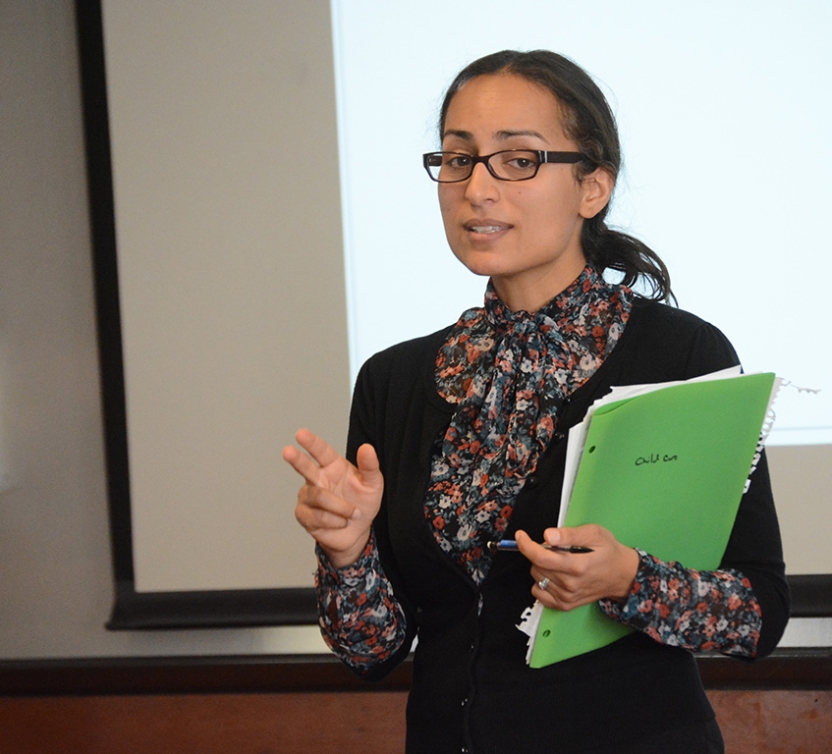Nobel Peace Prize "Romanticizes" What Really Happened in Tunisia

MIDDLEBURY, Vt. – Eleven days after the National Dialogue Quartet of Tunisia received the 2015 Nobel Peace Prize, a former elected representative to the Tunisian National Constituent Assembly (NCA) shared her views about the award for an audience at Middlebury College.
Mabrouka M’barek, who served in the NCA from 2011 to 2014, appeared on campus on October 20 as the guest of the Rohatyn Center for Global Affairs and the Program in Middle East Studies.
In her talk titled “Peaceful Narratives: Inside and Outside the Tunisian National Dialogue,” M’barek told the gathering of about 50 students and faculty “many Tunisians are skeptical of this year’s Nobel Peace Prize” and she explained some of the reasons why.
According to the Norwegian Nobel Committee, the National Dialogue Quartet composed of four powerful civic organizations “exercised its role as a mediator and driving force to advance peaceful democratic development in Tunisia” and facilitated “a democratic transition based on a vibrant civil society with demands for respect for basic human rights.”
M’barek takes strong exception to the Nobel Committee’s assertions. She compared the four organizations – the Tunisian General Labor Union, Human Rights League, Order of Lawyers, and Confederation of Industry, Trade, and Handicrafts – to the AFL-CIO, ACLU, U.S. Bar Association, and U.S. Chamber of Commerce, respectively, and drew this analogy:
“Imagine if in the United States when the Democrats and Republicans in Washington cannot agree, and this leads to deadlock, government shutdowns, and violence in the streets, and then four organizations … step in and start to make decisions in lieu of Congress and in lieu of the President of the United States.”
At first glance that scenario might not seem so bad after a revolution, M’barek said, but the Tunisian people knew better because of the country’s history.
Former dictator Zine El Abidine Ben Ali, who fled in 2011 in the first wave of the Arab Spring, had used the General Labor Union and the Confederation of Industry, Trade, and Handicrafts for years “as tools to create an illusion of pluralistic government,” she said. He also used political means (such as excluding certain political parties) and technocracy (the control of society through technological knowledge) “as a fig leaf for his repressive regime.”
After the fall of Ben Ali, the Tunisian National Dialogue didn’t allow for national dialogue, despite its name. According to M’barek, who was serving in the country’s duly-elected legislature at the time, the National Dialogue Quartet said, “Sign first and we will talk afterwards.”
“It is shocking really,” she offered. “The Nobel Committee gave the prize to a process that was wholly undemocratic. The committee, in my opinion, did not do its due diligence.”
Despite the fact that the Quartet was instrumental in pushing back calls to dissolve the National Constituent Assembly, the four organizations have no constitutional duty to report back to the citizenry, and major decisions in the North African nation of 11 million people “were made by civil-society organizations that were not elected or chosen by the people.”
“That’s why many Tunisians are frustrated with the Peace Prize because the prize has rewarded an undemocratic process.” The Nobel Committee “romanticized” what really took place in Tunisia, M’barek concluded.
Mabrouka M’barek taught the Winter Term course “Writing the Tunisian Constitution” at Middlebury College in 2015. She has been invited back for the 2016 Winter Term to teach “Tunisia and the Arab Spring” which will, in part, examine the National Dialogue Quartet and some of the issues surrounding its acceptance of the Nobel Peace Prize.
– With reporting and photography by Robert Keren

